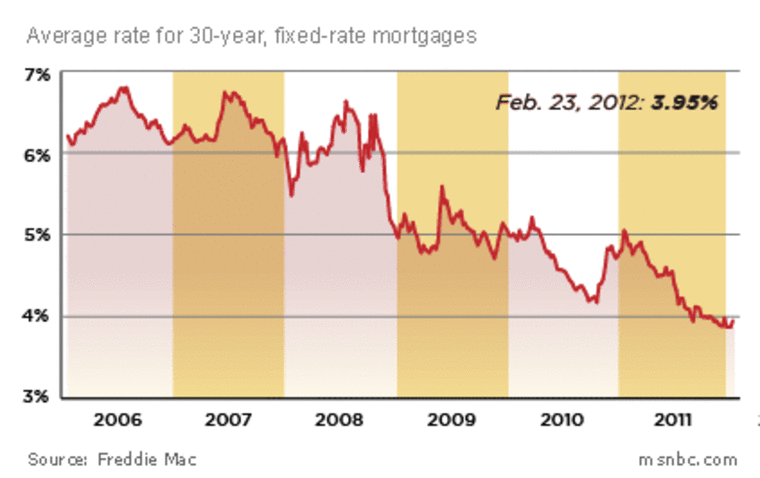Mortgage rates have fallen sharply in the wake of last week’s weak unemployment data, approaching or surpassing last year’s historical lows, Freddie Mac said Thursday in its weekly survey.
The average one-year adjustable-rate mortgage signed this week carried an interest rate of 3.41 percent, the lowest ever recorded in the 20 years the financing giant has been tracking the figure.
Rates on 30-year fixed-rate mortgages have averaged 5.41 percent this week, down sharply from 5.59 percent and the lowest level since July, Freddie Mac said. Lenders charged an average fee of 0.6 percent for both types of loans, the company said.
Bond prices soared Friday, sending interest rates lower after the government reported the economy added only 21,000 payroll jobs last month, far fewer than the 125,000 expected. The continued weak labor figures have reinforced expectations that the Federal Reserve will leave short-term interest rates unchanged at their current low levels for months and possibly into 2005.
The latest drop in mortgage rates is likely to generate at least a modest round of mortgage refinancing, although many homeowners have refinanced at least once in the low-rate environment of recent years.
Last June, as the economy struggled with slow growth, long-term mortgage rates hit their lowest levels since the 1950s, spurring a surge in home sales and refinancing. Freddie Mac's 30-year benchmark touched a low of 5.21 percent in mid-June.
Fannie Mae, the other giant government-chartered mortgage financing company, sharply raised its projection of 2004 loan volume Thursday because analysts expect the latest drop in rates will jack up refinancing activity.
Fannie Mae now expects lenders to process $2.43 trillion in loans, up from a previous forecast of $1.9 trillion, but still down from last year’s boom year.
“Even with the recent drop in mortgage rates ... refinance activity is likely to be below last year’s record level -- but we have substantially raised our projection of refi activity for this year from previous forecasts,” said the forecast from Fannie Mae economists David Berson and Orawin Velz.
In 2003, lenders processed a record $3.7 trillion in mortgages, including $2.53 trillion for refinancing, Fannie Mae said. Fannie Mae also is projecting that 2004 will be a fourth consecutive record year for single-family home sales, surpassing last year's 7.2 million homes.
Frank Nothaft, Freddie Mac’s chief economist, said homeowners might consider switching to ARMs given the current record low rates.
“We predict ARMs will make up a much larger share of originations this year, perhaps the highest since about 1995,” he said in a statement accompanying the survey results.
Last year at this time one-year ARMs averaged 3.68 percent, and 30-year mortgages were at 5.61 percent.
Other mortgage rates also have fallen sharply this week. The average for a 15-year fixed-rate mortgage has fallen to 4.69 percent from 4.88 percent last week and 4.93 percent a year ago.
Reuters contributed to this report.
